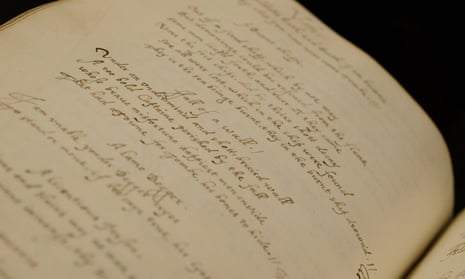John Donne is hailed as one of the greatest writers in the English canon, the author of exquisite love poetry and magnificent prose that has entered everyday language. To his 17th-century contemporaries, he was “the best in this kinde, that ever this Kingdome hath yet seene”.
Now a bound volume of more than 400 gilt-edged pages filled with 131 of his poems has been saved for the nation after being acquired by the British Library. Dr Alexander Lock, curator of modern archives and manuscripts, told the Observer: “It’s a manuscript of considerable literary importance, a new substantial work of Donne’s poetry that has not yet been studied.”
Carefully transcribed in ink by an unknown hand, the manuscript is one of the largest and earliest surviving collections of poetry by Donne, who was a contemporary of Shakespeare.
The volume includes Donne’s famous works, The Storm, The Calm, The Breake of Daye and Sunn Risinge, as well as a few contributions from lesser-known contemporaries.
Lock said: “There are also about six unpublished, unattributed poems, so that could be really interesting. Are they works by a major author? Or is there an author there that we should learn about?”
Donne is one of the best-known poets of the late Tudor and early Stuart periods. He was also a priest and preacher, and a powerful orator of his own sermons. He became dean of St Paul’s Cathedral, where he is buried.
Donne has been described as the greatest love poet in the English language, and he coined phrases such as “No man is an island” and “For whom the bell tolls”, but he disliked the idea of writing for money. He regretted allowing his long poems, the Anniversaries, to be printed in 1611 and 1612, describing it as an error: “[I] do not pardon myself.”
His first volume of poetry was published posthumously in 1633, having been circulated only in manuscript copies among select groups of friends and patrons.
Lock said: “He famously eschewed printing. He felt he could target a readership that was much more discerning. He’d send his manuscripts to select groups. They would then copy the lines down and share them. So this helps us study who those people were. It’s unknown. Hopefully it will help us answer lots of questions.”
He added: “Virtually no poetry in Donne’s hand survives. That’s why these manuscript copies are so important. It offers evidence as to how Donne’s poetry was written, copied and circulated, as well as helping to further shape our understanding of his audiences and patrons.”
The volume was discovered in 2018 in private hands at Melford Hall, the National Trust property in Suffolk, where it is believed to have been kept for at least 200 years. In 2019, the Department for Digital, Culture, Media and Sport imposed a temporary export bar on the work, warning that it was “at risk of being lost abroad” unless a UK buyer could match the £466,000 asking price.
The British Library’s acquisition – to be announced on Monday – was made possible by various sources, including the National Heritage Memorial Fund, and individuals such as Paul Chrzanowski, an American physicist and collector of early English texts, who has made numerous donations to public institutions.
The binding and watermarks suggest that it dates from between 1625 to 1635. Lock described the text as “beautifully legible, in a lovely clear hand”, with partial annotations from a later reader.
It will be available through the British Library’s website from Monday and to researchers in its Reading Rooms in 2021.
